|
Welcome to A&A. There are 23 full reviews in this issue. Click on an artist to jump to the review, or simply scroll through the list. If you want information on any particular release, check out the Label info page. All reviews are written by Jon Worley unless otherwise noted. If you have any problems, criticisms or suggestions, drop me a line.
|
|
|
A&A #233 reviews (September 2002) Old Friends (short reviews of previously-reviewed artists):
 C. J. Reaven
Borosque C. J. Reaven
Borosquewith Rent Romus' Lords of Outland The Metal Quan Yin (Edgetone) The whole notion of a poet rhyming over the squonks and yips of a jazz band is so very fifties. I've got this image of some skinny dude with a goatee all dressed in black up at the mic, with some other weenie whacking a bongo or something. That's not what's going on here. C. J. Reaven Borosque has an imposing presence. Her poems are hardly light or delicate. And Rent Romus and the Lords of Outland aren't really bongo-bashing dingbats. Which is not to say that this is somehow more mainstream fare. Not at all. The fiery combination of poet and band shoots these pieces straight for the edge of space and time. Blistering thought--both musical and poetic. Not for the meek or lazy, this isn't. But those seeking adventure and something, you know, different, will find precise what they crave. Feel the chaos. Let the waves crash over your head. Absorb every body blow. And then do it all over again.
������������������������������������� 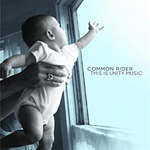 Common Rider
Common RiderThis Is Unity Music (Hopeless) Ever listen to the original ska from the sixties? It had a great stripped-down sound. A lot of the recent big-name skasters seem to have forgotten that. Common Rider hasn't. Yeah, this is punk music through and through, with just a hint of a ska lilt. The sound is tight, but it's also slight. Spare. Basic. The perfect platform for supremely melodic songs. Smartly-written pieces played with style and verve. Almost no attitude whatsoever. This music sounds, um, nice. Pleasant. A punk record to take home to Ma. And that's not an insult. I think there's room for well-crafted, nice-sounding punk. Maybe the kids want louder guitars and screechy vocals, but I'll always be happy to praise people who take the time to make a great record.
 Cordero
CorderoLamb Lost in the City/ Cordero Perdido en la Ciudad (Daemon) Ani Cordero writes the songs, sings, plays guitar and generally rules the roost. As the album title intimates, the songs here are sung both in English and en Espanol. The music, as well, shifts with the languages. The English songs sound a lot like basic indie rock with the edges softened. Cordero has a great ear for melody, and she's not afraid to write pretty songs. The pieces sung in Spanish have a lounge-ranchera feel, kinda like if Willie Nelson (in Stardust mode) and Tish Hinojosa were playing the Albuquerque Ramada Inn. That's a good thing, by the way. The sound here is as laid-back as the songs. There's a lilt in the air, and a languid feel permeates. Beautiful and easy-going, but still very well crafted. This album is an immediate grabber, and the quality throughout makes listening a true pleasure. The sound is a natural. Wonder why no one else is doing it.
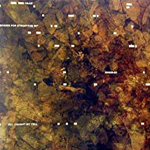 Craw
CrawBodies for Strontium 90 (Hydrahead) Some things do get better with age. Craw has been around for nearly as long as I've been doing A&A, and I've reviewed just about everything the band has done. I've always thought there was room for good, crafted noise metal, and Craw has been one of my favorite examples. This album doesn't let me down. The lines are tighter and the sound isn't as chaotic. Craw has matured, and actual songs are the result. There's a still a raucous, noisy feel to the proceedings, but the guitar riffs sound practiced (though not stilted) and at times a vague prog fog descends upon the songs. And none of this is bad. One of the things I most like about Craw is the band's willingness to try out new ideas. Unlike many musical explorers, most of these journeys sound great. The same is true of this album. Just a wonderful, blistering set. I've been singing the praises of Craw for many years. I hope to do so for many years to come.
������������������������������������� 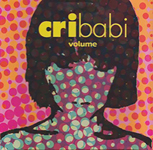 Cribabi
CribabiVolume (Fidela) Andy Cox (once of Fine Young Cannibals) puts together the electronic grooves, and Yukari Fujiu does the crooning. The result is a bubbly, surprisingly tasty confection. Cox believes in populating his songs with every sound imaginable. With the caveat that each must have a supremely addictive dance groove. Past that, he throws in a host of ideas, challenging Yukari F to match his adventurousness. Not a problem. Fujiu is as versatile as Cox, and more than willing to try out something new. And so the effervescent sound of this album somewhat masks the depth and quality present. One of those albums that sounds like the pop of tomorrow. Given the pedigree, that just might be the case. The pretty wrapping is just the beginning.
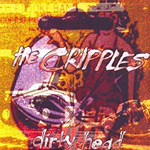 The Cripples
The CripplesDirty Head (Dirtnap) Some more of that keyboard-driven, vaguely-new wave pop punk that I'm coming to expect from Dirtnap. Low-grade production values, hi-test hooks. The distortion can be immense at times, almost drowning everything out. And that's okay. Can't say if it's an artistic choice or simply some novice at the board, but it doesn't matter. When the sound fuzzes out, the energy still drives the songs. Basic basic basic, which is something you ought to have deduced by this point. The Cripples aren't trying to rewrite the history of rock and roll. They're just trying to bash out a few tunes. Fun ones at that. There's a lot here to like, especially if you like your punk of the minimalist variety. I'll take bliss, no matter its source.
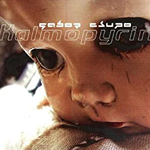 Gabor Csupo
Gabor CsupoKalmopyrin (Tone Casualties) Gabor Csupo is still techno, and he's not about to apologize for that. Good for him. When you're as adventurous as he is, what matters is not the genre label, but the quality level. And that's very high. Time after time, Csupo takes chances. And they almost always pay off. His sound is warm and inviting, hardly the stereotypically sterile feel you might assume. Indeed, these songs are almost conversationally approachable. Csupo simply dances all around a variety of electronic sounds. Most often, he's closest to techno, but he never stand still long enough to really get a good fix. That just makes for a most engaging album. Top-notch work all the way around. No two songs here sound even remotely similar, which is very impressive. A disc worth exploring over and over again.
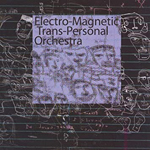 Electro-Magnetic Trans-Personal Orchestra
Electro-Magnetic Trans-Personal OrchestraElectro-Magnetic Trans-Personal Orchestra (Pax Recordings) Four pieces, each titled by its particular key. Aaron Bennett leads this sizable ensemble, the make-up of which is string-heavy. In other words, the orchestra part of the name isn't exactly off-target. A jazz orchestra, actually. Bennett penned these songs, in a way. He set up a method of organizing improvisation so that the songs flow the way he wanted them to, but which left plenty of room for the many players to make impressive contributions. In general, the songs meander much the same way as John Coltrane's later work. I suppose it helps that George Cremaschi's bass playing reminds a whole lot of Jimmy Garrison. I dunno. Still, the presence of the strings lends these pieces an otherworldly quality all their own. Exceptional musicianship is what drives these pieces. I like the structures laid down by Bennett, but by leaving the door open for his collaborators to move around, he ensured greatness.
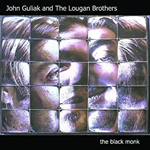 John Guliak and the Lougan Brothers
John Guliak and the Lougan BrothersThe Black Monk (Mint) There's been a resurgence of interest in Gram Parsons lately, what with a new biography on the shelves and the ever-increasing popularity of what some call alt. country. John Guliak kicks off this album with "Streets of Baltimore," a track Parsons also covered. And in general, he travels much the same country-rock road. The songs are almost self-consciously old fashioned, and Guliak's rugged voice brings to mind Merle Haggard. In other words, these songs sound authentic. Whether he's singing his own songs or a classic, Guliak hits each piece dead center. His band, which is not made up of brothers named Lougan but rather something of a western Canadian all-star team, is similarly focused. There's nothing better than finding a new classic. This album sounds like it has been rolling around for thirty years, picking up dust in some forgotten shop. I can't think of a higher compliment.
 Carolyn Mark and the Room-Mates
Carolyn Mark and the Room-MatesTerrible Hostess (Mint) Carolyn Mark has one of those weather-worn voices that is simply perfect for county music. She has an innate feel for selling a song, and she emphasizes different flaws in her voice in order to create a greater emotional impact. Of course, Mark has no intention of playing straight country music. She'll tear the hell out of a torch song, scoot off on a shuffle and then skip through a bluegrass reel. Aiding in her on this journey are the Room-Mates, Tolan McNeil (who, along with Mark, served as one of the "Lougan Brothers" on John Guliak's album) and Garth Johnson. Their contributions cannot be underestimated. The range of songs here is impressive. What's astonishing is that Mark and the Room-Mates manage to pull off this trick. To be honest, I'm not surprised. She's got one hell of a track record. Even so, I'm knocked out. John Guliak's album sounds like it was recorded in 1972. This one goes back 10 years before that, back when country was still mannered but not restricted. Marks matches her incomparable voice with a creative streak that simply electrifies.
������������������������������ �������������������������������������  Richard McGraw
Richard McGrawHer Sacred Status My Militant Needs (Non-Utopian) Richard McGraw separates his songs into chapters, or at least sections. I suppose there are a few thematic reasons for this, but most of the songs on this album deal with existential crises of one kind or another. In a most witty fashion, might I add. That wit is both musical and lyric. McGraw's acoustic guitar-driven sound could get overbearing quite quickly, but he has a deft writing touch and a most engaging playing style. These songs simply aren't dreary, when by all rights they should be. I love the stark sound. It would be really easy to overdub the acoustic guitar or even crank up an electric to "fill out" these pieces. But that would have been a horrible mistake. McGraw leaves his sound raw but rounded, right where it should be. Sometimes this sort of album takes a while to grow on me. I'm not always the most meditative person. But McGraw's skill and intensity drew me in immediately. If you let yourself become engrossed in this album, it will wear you out. And you'll beg for more.
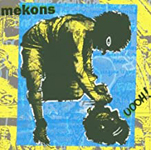 The Mekons
The MekonsOOOH! (Quarterstick) The most recent Mekons album, Journey to the Edge of the Night, was perhaps the band's most coherent and traditional collection. Looking at the Mekons story (as it were), that would mean that this album would most likely be, you know, out there. And while these songs are certainly somewhat more varied in their influences than those on Journey, once again the Mekons have put together a stunning album that might tempt the mainstream. Musically, at least. The lyrics, on the other hand, are typically idiosyncratic. Many songs take different shots at organized religion, but the tone is more bemused than angry, even on a song like "Hate Is the New Love." There are also a couple witty meditations on the lives of aging punks and a few other ideas tossed in besides. Trust me; it all makes sense when put together by these folks. Perhaps as typical a Mekons album as there has ever been. Very few musical excesses, but this late-found devotion to melody and structure hasn't dulled the creative fires whatsoever. Indeed, the somewhat off-hand conformity of these songs is an even stronger repudiation of processed rock than the conceptual art-punk creations of old. A great many people much more influential than me have said this before, but it bears repeating. The Mekons are unforgettable and irreplaceable. If you have a chance to catch one of their 25th anniversary shows, don't let it pass you by.
�������������������������������������  Metal Machine
Metal MachineKinked Slinky (Sanity Check Musec) Two guys, Terry Miller and Blue, combine to play blistering industrial blues. Most of the time, I get pretty tired pretty quickly of what I like to call "white boy blues," where the guitar makes more noise than emotional impact. First, that's not the case here. Blue plays loud (really loud) and distorted guitar, but he's got a nice feel. And these songs are playful. Hard to do that with a drum machine and other processed elements, but these boys manage just fine. This shouldn't work. There's just no way this music should sound anywhere near as cool as it does. And yet, here it is. No denying that. And no denying the quality. The sound is unrefined despite its technical prowess, and that's probably what keeps Metal Machine from degenerating into some sort of parody. As it is, this is some fine fare.
�������������������������������������  Namelessnumberheadman
NamelessnumberheadmanWhen We Leave, We Will Know Where We've Been (Urinine) The NCAA moved from Kansas City to Indianapolis, and Urinine Records moved from Indy to K.C. I'd say my old stomping grounds between the Kansas and Missouri rivers got the better end of the deal. All personal notes aside, Namelessnumberheadman follows in the footsteps of a number of Urinine bands, playing esoteric pop with verve and an eye for the unusual. Indeed, while most of the songs here could be characterized as understated, they're all mellow in different ways. Some have a folky feel, other utilize instruments like marimba or simply trip out electronically. All of this floated over a core that is grounded in a Slint-like devotion to off-kilter song construction. I'm not entirely sure that Namelessnumberheadman has quite established its own sound with this album. On the other hand, the diversity on this disc speaks reams for the talent within the band. A wonder that continues to unfold.
������������������������������  The Negro Problem
The Negro ProblemWelcome Black (Smile Records) For his next project, Stew decided to get together his old band. And so the Negro Problem rides again. I'm not familiar with this particular band's previous outings, but it is highly reminiscent of the Stew album I reviewed a few months back. Tightly-written songs that dabble in country, soul, pop and rock--played by a crack band and sung with all appropriate style. I suppose the band name and album title are wry comments on the obvious. Stew is black, and this music just doesn't sound, you know, black. Never mind that the greatest pop and rock bands ever (the Beatles and the Stones) made no bones about the fact that they were playing black music. And I'm sure I don't need to mention Elvis... See, it doesn't matter if this is white music or black music or green music or purple music (didn't Sly and the Family Stone say something like that once?). The only important question is quality. Stew and the Negro Problem make great music. Period. And that's all that needs to be said. ������������������������������ ������������������������������������� 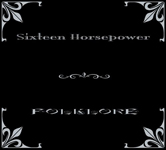 Sixteen Horsepower
Sixteen HorsepowerFolklore (Jetset) Somewhere between Wil Oldham and Billy Bragg and Uncle Tupelo's March 16-20, 1992 falls Sixteen Horsepower. I would've guessed these guys were from Montreal, but in fact they're based in England. Which makes sense, given that they're on Jetset. And once again, that fine record label has identified a coming musical trend and then picked an outstanding representative for its roster. Sixteen Horsepower specializes in dramatic folk readings, with plenty of deft musical touches driving the sound. Very crafted, and yet still quite emotionally satisfying. This isn't drama for drama's sake. This is music that delves into the deepest human emotions and examines what people do when driven to extremes. Not nice music. Beautiful, but not nice. I've heard plenty of bands try to do this whole folk noir (a term I stole from a Molasses poster) thing, and these boys have as good a handle on it as anyone. Quite the ride.
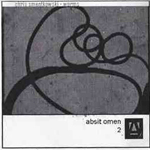 Chris Smentkowski
Chris SmentkowskiWorms CD3 (Absit Omen) Chris Smentkowski, who might be better-known as part of the Panicsville and Brain Transplant phenomena, launches forth a short (in time) assault on the concept of sound itself. The pieces here are mostly quiet, consisting of a dim industrial hum or other such noise. Every once in a while, Smentkowski brings in some heavier electronic disturbances, but mostly he's content to lurk in the background. Which is cool. I'll admit, this disc is for fools like me who like to burrow into sound to see what lies beneath. There's plenty of subtext within the rumblings here. And if you don't want to dig it, then don't. But for the few of us who don't mind thinking about our music, worms leads to treasure.
 The Standard
The StandardAugust (Touch and Go) In many ways, the Standard isn't yer usual Touch and Go band. The sound is often atmospheric and keyboards play a large role in the band's approach to songs. On the other hand, the guitars play linear lines (in addition to distorted chord washes) and there is a definite sense of allegiance to the noise fusion sound so well-loved in the Chicago indie community. Of course, the Standard hails from Portland. Which probably explains the unique take on the Slint/Rodan axis. To be perfectly honest, I like the noodly keyboards. They're playful, not proggy, and they add a sense of fun to what otherwise might be dreadfully solemn fare. Now, I'm a big fan of serious abstraction, but I think these folks balance things out nicely. With all of the different ideas and styles in the mix, a keen sense of what works and what is excessive is important. Thoughtful, fun and ultimately quite moving. The Standard has put together a complete effort here. It's easy to hear all sorts of influences bopping in and out, but what really emerges is a sense of the Standard. A very good sense, to be sure.
 The Starside Eight
The Starside EightGoodnight Noises Everywhere (Electric Frog Recordings) Mainly the duo of James Eight and JJ Starside, who trip through a nice selection of (generally) acoustic pop. The hooks are ragged and the sound is decidedly folky, but for some reason I get the idea that these boys really want to sound like the Posies. I could be so far off with that observation, but there are these little hints. The vague attempts at harmonies--which sound something like "we're not real good at this, so we won't try too hard to sound bad"--are one. The clincher is jaunty strummers like "Fit of Love." And then, of course, there's the fact that the Posies began as an acoustic duo. Pretty, generally introspective songs. Even the raucous bits are measured. There is very little unfettered anything here, even when the electrics kick in. And that's alright. There's no need to act like crazy buffoons when you have such a nice handle on channeling an inner voice. Charming, I guess, is the best description I can come up with. Which isn't to say that these are songs brimming with joy and hope. A couple do, but mostly these songs stick to familiar theme of outsiders looking in. And what voyeurs they are!
������������������������������ ������������������������������������� 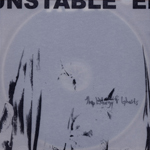 Unstable Ensemble
Unstable EnsembleThe Liturgy of Ghosts (Family Vineyard) Two saxes (bari and soprano), a guitar, some percussion and a little electronic work. Quite deliberate and thoughtful improvisations. Unstable Ensemble is in no hurry to get anywhere. The lack of due haste can be a bit maddening, but after a few minutes I acclimated to the band's pace and began to get more in the mood. The spaces between the sounds speak almost as much as the music itself. And that is a compliment, no matter what you might think. Music is all about using sound (and the lack thereof) to express ideas. And by that measure, these folks have a tight grasp on the secret to making good music. There's nothing easy or simple about this album. The sounds presented challenge the listener with unabashed glee. You either want to get it, or you don't. I'll tell you, though, a little patience will be rewarded.
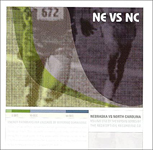 Various Artists
Various ArtistsNE VS NC 2xCD (Redemption) Volume one of Redemption's "Versus" series features bands from Nebraska and North Carolina. Or, to be more specific, bands from Omaha and Chapel Hill. There are a few bands on each disc who don't hail from those precise locales, but I think there are obvious reasons why eastern Nebraska and the Durham-Chapel Hill-Raleigh areas are the centers of musical creativity in their respective states. And, strangely, I've been rather well-connected to each of those scenes at different points in my life. As a college student at the University of Missouri some 10-15 years ago, I heard a ton of Omaha and Lincoln bands in the clubs. And now that I live in the Triangle region of North Carolina, I must admit to being familiar with almost all of the bands on the NC disc. I can't argue with the quality of what's here. But I do wish there was a bit more diversity to the sets. Both discs are emo-heavy, and I know both scenes have up-and-coming bands with different sounds. In particular, around here Chapel Hill is probably better-known as the home of the Mayflies USA and the place where Ryan Adams got his start. And for a long time, Nebraska was known as the home of the Millions. Which isn't to say things can't and don't change. There's no way to completely document a scene on one CD. Redemption has pulled together 17 bands from Nebraska and 17 more from North Carolina. All the bands are good, and all the songs are interesting, if not great. My quibbles are just that; this set is so good, I wish it were that much better.
�������������������������������������  The Vernicious Knid
The Vernicious KnidDays that Stand Still EP (AntiAntenna) At once both strident and yet surprisingly melodic, the Vernicious Knid brings to mind long-gone midwestern emo bands like Boys Life. The songs are complex, but that complexity is somewhat hidden by an energetic attack and an always-moving rhythm section. That the six songs here all find their grooves in different ways is impressive. Even more so is the fact that it's pretty easy to discern a coherent band strategy. These guys know precisely what they're doing. Viscerally attractive, and yet subtle enough to spur contemplation as well. That's tough to accomplish, but the Vernicious Knid seems to do it effortlessly. The sort of disc that's almost impossible to put away.
������������������������������������� 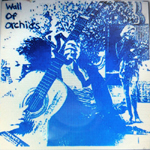 Wall of Orchids
Wall of OrchidsWall of Orchids EP (The Bus Stop Label) Lane Steinberg is Wall of Orchids. He's got great handle on pop music of the early 70s, whether he's channeling Burt Bacharach, Big Star, Todd Rundgren or the Flying Burrito Brothers. In fact, his style is something of an amalgam of all that and more. These songs evoke that period, but there's something utterly modern within them. I can't quite put my finger on it. Suffice it to say that Steinberg is much more than a simple rehash artist. Rather, he's found his own little niche in the pop world. These songs are gorgeous and glowing. Would there were twice as many (or even more). Finest quality.
������������������������������
Luke Holder This Was a Giant (self-released) |
|
return to A&A home page